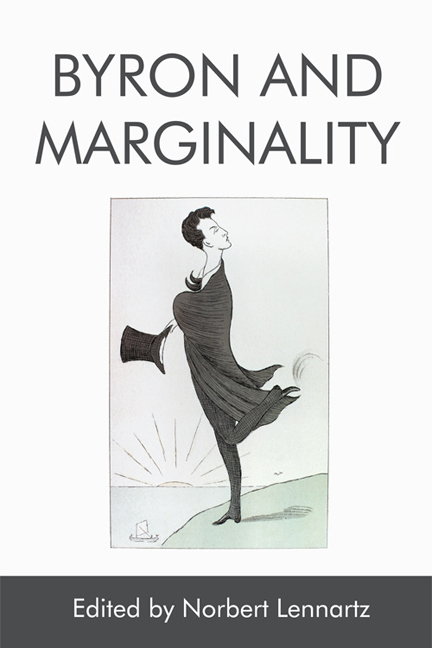Book contents
- Frontmatter
- Contents
- Foreword
- Acknowledgements
- Editions and Abbreviations
- 1 Lord Byron, Wandering and Wavering between the Centres and Margins of Romanticism: An Attempt at an Introduction
- I Byron’s Marginalisation in Romantic World Literature
- II Byron’s Marginal Identities and Places
- III Cherishing the Marginal – Marginal Genres in Byron
- IV On the Provocative Margins of Taste
- V Marginal Affairs – Visual and Paratextual Aspects in Byron
- List of Contributors
- Index
13 - At the Margins of Romanticism: The Women of Don Juan’s English Cantos
Published online by Cambridge University Press: 06 May 2021
- Frontmatter
- Contents
- Foreword
- Acknowledgements
- Editions and Abbreviations
- 1 Lord Byron, Wandering and Wavering between the Centres and Margins of Romanticism: An Attempt at an Introduction
- I Byron’s Marginalisation in Romantic World Literature
- II Byron’s Marginal Identities and Places
- III Cherishing the Marginal – Marginal Genres in Byron
- IV On the Provocative Margins of Taste
- V Marginal Affairs – Visual and Paratextual Aspects in Byron
- List of Contributors
- Index
Summary
It was a cliché of early and mid-twentieth-century criticism to see Byron's late ottava rima poems as leaving the Romantic in a turn backwards to the Neoclassicism and mock-heroic of Pope. Later descriptions, including my own, preferred to characterise the shift as a forward step into the instability of Romantic Irony and the world of Sterne, Clough, Melville and Joyce. In this essay, born from, and retaining something of the informality of, a lecture – and probably my valedictory wave to the poem, at least in print – I am not concerned with the taxonomy per se, but in its use heuristically. I will argue that a better way of accounting for the experience of reading Don Juan (1819–24) is to think of an inconstant fluctuation between satire assuming a stable world view (looking towards Pope), and irony that dissolves any such possibility of stability, further troubled by a nostalgia for a something more transcendent (looking towards the Romantic), and almost its exact opposite, an insistent blockish physicality. Another way of putting that is to say that the unstable ironic world, created with immersion and gusto, includes nevertheless a nostalgia for a stable world either Classically civilised or Romantically transcendent – but that is not quite accurate, for inside the experience it is not nostalgia but reality. Is a better characterisation a sense of the elegiac – not nostalgia for time past, but the awareness of our human time passing against the solidity of the material, yet without devaluing the present or the evanescent emotion? The three central female figures of the English Cantos are taken as a key part of this shadow-play.
That meaning for Byron at least in his later years resides not in nature but in art, not in an objective world but in a world created by ourselves, is most pointedly expressed in the letters of the Bowles controversy, and is thus often linked with his admiration for Pope and with satire. But aside from his typical energy in the Bowles letters we must distinguish his more extreme view of the artificial from Pope’s. From Manfred onwards, it is art – ‘stories’ in the sense of Beppo's (1818) concluding stanza – that gives life value.
- Type
- Chapter
- Information
- Byron and Marginality , pp. 254 - 268Publisher: Edinburgh University PressPrint publication year: 2018



